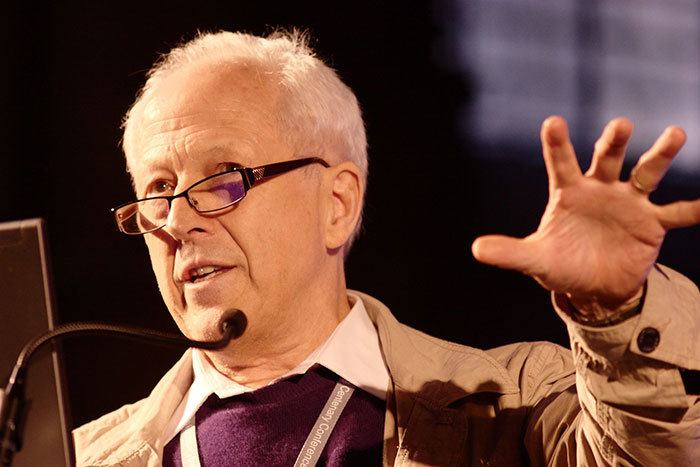Profile: Professor George Ellis
28 August 2015 | Story by Newsroom
George Ellis, senior scholar and emeritus distinguished professor of complex systems in the Department of Mathematics and Applied Mathematics
Gravity and cosmology, complexity and causation, and brain and behaviour are three areas in which Professor George Ellis has focused his research. From looking at inhomogeneity in the different scales of the Universe to studying the nature of primary emotional systems in the human brain, his work has opened new doors of knowledge.
Ellis obtained the BSc Honours degree in physics from the University of Cape Town, and PhD in Applied Mathematics from the University of Cambridge, later completing a BSc Honours in business data processing at UCT. He worked at a variety of institutions including the University of Cambridge, the University of Texas, Queen Mary College (London), the University of Alberta, Boston University, and SISSA (the International School of Advanced Studies in Trieste). He also spent time as a visiting professor at the Enrico Fermi Institute at the University of Chicago and at the Max Planck Institute for Astrophysics in Germany.
His research covers a wide area in the realms of natural and mathematical sciences and neuroscience, looking at issues as diverse as the dynamics of general relativity, top-down causation, the nature of space/time, the relation between human emotion and brain plasticity, low-income housing policy, and the nature of social indicators. His PhD work at Cambridge explored inhomogeneous and anisotropic cosmologies and singularities, culminating in his co-authoring, with Stephen Hawking, the book The Large Scale Structure of Space-Time in 1973, now regarded as a classic. On his return to South Africa, he established the Cosmology Research Group at UCT, with many of its students going on to play important roles in the South African science sector. Ellis is a founding member of the Academy of Science of South Africa, participated in the commission that recommended the construction of the Southern African Large Telescope, and served as a member of the task group responsible for drafting SA's Green Paper on Science and Technology.
Over the course of his career, Ellis has published more than 500 articles in journals such as Nature, Physical Review and the Astrophysical Journal and authored/co-authored 12 books and numerous book chapters. He has served on the editorial boards of Classical and Quantum Gravity and the Monthly Notes of the Royal Astronomical Society, served for five years as editor-in-chief of General Relativity and Gravitation, and has been an editor of Physical Review X.
Ellis obtained his first NRF A-rating in 1984, the implementation year of the rating system, and is one of only three scholars who have managed to retain this rating to date. His work has garnered considerable recognition worldwide, including the John FW Herschel Medal of the Royal Society of South Africa, the Academy of Science of South Africa Gold Medal, the Medal of the South African Mathematical Society for Research Distinction, and the Templeton Prize. He was also awarded the Star of South Arica by President Nelson Mandela, and the Order of Mapungubwe (Silver) by President Thabo Mbeki. He is a Fellow of the Royal Society (London) and of the Third World Academy of Science (TWAS).
 This work is licensed under a Creative Commons Attribution-NoDerivatives 4.0 International License.
This work is licensed under a Creative Commons Attribution-NoDerivatives 4.0 International License.
Please view the republishing articles page for more information.










